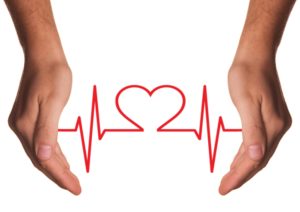This issue of Making a Difference! is brought to you by…
 Alma Esakoff
Alma Esakoff
(805) 748-6336
Send Us An Email
Go Shopping
In this issue…
♦ Self-care for your heart… ♦ 5 major causes of heart disease
♦ Anatomy of the heart… ♦ 3 major complications caused by heart disease
♦ What you can do to avoid heart disease…
♦ Am I having a heart attack… or not? ♦ Shaklee for a healthy heart…
♦ Why you should switch to Get Clean Dish Washer Concentrate
♦ Dishwasher “dirt”
 “The heart is not a large organ… only about the size of your fist… but you should be very thankful that Nature has made it the durable marvel [it is]! A simple, muscular organ… but so important to your well-being! The task performed by your heart is almost beyond human understanding. The marvelous thing about this pressure-pump is that it NEVER takes time off from its work!”
“The heart is not a large organ… only about the size of your fist… but you should be very thankful that Nature has made it the durable marvel [it is]! A simple, muscular organ… but so important to your well-being! The task performed by your heart is almost beyond human understanding. The marvelous thing about this pressure-pump is that it NEVER takes time off from its work!”
~ Dr. Forrest C. Shaklee, Sr.
Self-care for your heart…
Your heart is directly involved in supplying all of your organs with the oxygen the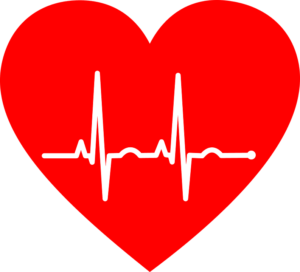 y need to function properly. Without it, your body would completely shut down!
y need to function properly. Without it, your body would completely shut down!
Learning more about the anatomy and functions of your heart can help you understand not only the role it plays in your overall well-being but also how you can take better care of it to avoid heart disease.
Functions of the Heart
Each day, your heart pumps about 2,000 gallons of blood, delivering this oxygenated blood throughout your body. Your cells could not perform cellular respiration without oxygen, a function that breaks down nutrients into energy and waste. The heart pumps de-oxygenated blood into the lungs for oxygenation.
Once blood has been oxygenated, it moves from the lungs back into the heart. Your heart then pumps it through your arteries, which carry it to organs and tissues throughout your body. Once the oxygen is used up, blood returns to the heart to be oxygenated once again.
5 major causes of heart disease
Here are 5 factors that can contribute to heart disease:
- Smoking damages your blood vessels, restricting blood flow and raising blood pressure.

- High blood pressure caused by plaque build up damages your arteries.
- Diabetes reduces your body’s ability to produce nitric oxide. a vasodilator which widens your blood vessels.
- High cholesterol increases the amount of plaque in your blood vessels inhibiting blood flow.
- Genetics can also play a role in determining your heart disease risk.
Anatomy of the heart..
Your heart is a complex organ made up of a series of chambers, valves, and tissues. Each part of your heart is involved in circulating your blood throughout your body, and damage to any of them can jeopardize your health.
Chambers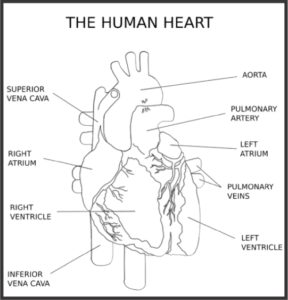
Your heart consists of four chambers. You have left and right atria located in the upper area of the heart and left and right ventricles in the lower area. The left and right sides are separated by a muscle wall known as the septum.
Blood enters your heart through the atria from your veins. It passes from the atria into the ventricles, which then pump the blood out of the heart.
The atria are thinner than the ventricles, as not as much force is needed to transfer blood between the chambers of the heart. More force is needed to pump blood out through the arteries. The right atrium receives de-oxygenated blood and passes it through to your pulmonary system via the right ventricle. Your left atrium receives oxygenated blood from your lungs, which is then pumped out from your left ventricle to the rest of your body.
Valves
Heart valves control the flow of blood through the heart, ensuring everything stays moving in 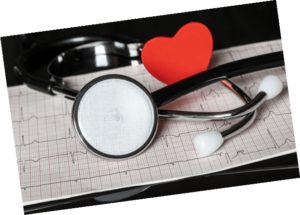 the right direction.
the right direction.
Atrioventricular valves, also known as cuspid valves, are located between the atria and ventricles. They close as the ventricles contract, preventing blood from flowing backward into the atria once it has passed into the ventricles.
Your heart also contains semilunar valves, which are located near the bases of the ventricles. These valves close and the ventricles relax, and these actions keep blood from flowing back into the ventricles after it’s been pumped out into your circulatory system.
Blood Vessels
Your heart is connected to many different blood vessels that carry blood to and from different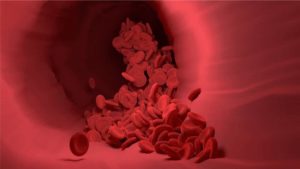 cells and organs. These include both veins and arteries. While your veins bring de-oxygenated blood back to your heart, your arteries pump oxygenated blood out of your heart and through your body.
cells and organs. These include both veins and arteries. While your veins bring de-oxygenated blood back to your heart, your arteries pump oxygenated blood out of your heart and through your body.
Your largest artery, the aorta, brings blood to many different areas through smaller branches. You also have the superior and inferior vena cava, which bring de-oxygenated blood back to the heart from your upper and lower body, respectively. Your pulmonary artery and veins carry blood between your heart and lungs.
Your heart needs oxygenated blood to function too. This is supplied by the coronary arteries.
3 major complications caused by heart disease
Heart Attack
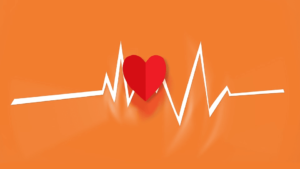 Heart disease can limit not only the blood flow throughout your body but also the supply of blood to your heart. The supply of oxygenated blood can be restricted due to plaque buildup in your coronary arteries (coronary artery disease)… the primary cause of heart attacks.
Heart disease can limit not only the blood flow throughout your body but also the supply of blood to your heart. The supply of oxygenated blood can be restricted due to plaque buildup in your coronary arteries (coronary artery disease)… the primary cause of heart attacks.
During a heart attack, the cells in your heart don’t receive enough oxygen, and start to die.
Congestive Heart Failure
Congestive heart failure is also caused by the narrowing of the arteries that supply blood to your heart due to plaque buildup. It is named after the ‘congestion’ that occurs in body tissue when blood is unable to circulate properly. This often causes swelling in the legs and ankles.
Heart failure can also be systolic or diastolic. Diastolic heart failure means your heart isn’t properly relaxing between beats, while systolic means it isn’t properly contracting.
Renal Failure
Chronic kidney disease affects about 14 percent of the population. Long term high blood pressure damages the arteries that supply blood to your kidneys, speeding up the progression of kidney disease to renal failure.
In the state of renal failure, your kidneys are no longer able to filter blood on their own. Renal failure is irreversible, and if left untreated, can be life-threatening.
What you can do to avoid heart disease…
Avoiding heart disease can be as simple as making adjustments to your lifestyle. Heart disease is often the result of the daily choices you make, For example:
“Should I buy fast food or should I make a healthy meal at home?”
“Should I go on a run or should I watch that TV show?”
The decisions you make become habits, good or bad, and their effect adds up over time.
If you want to reduce your risk of heart disease, you can start by exercising, reducing stress, quitting smoking, and eating healthier.
Get active
Just a few minutes of exercise each day has a significant impact on your cardiovascular health.  People who are physically fit have a much lower risk of developing heart disease.
People who are physically fit have a much lower risk of developing heart disease.
Make sure to include exercise that increases your heart rate for the best cardiovascular benefits. Any kind of movement that can raise your heart rate or strengthen your muscles makes a big difference.
Reduce stress
Sustained stress is bad for your heart as it raises your blood pressure. Take time out of your day to de-stress. Schedule time to relax and have fun. Try meditation or yoga.
Stop smoking
Heavy smoking increases your risk blood clots which can lead to a heart attack or stroke. So whatever “stop smoking” method works for you, just quit!
 Control your diet
Control your diet
If you eat a lot of high-fat, high-sugar, and high-cholesterol foods, you are actively contributing to your risk of heart disease. Work to eliminate these foods from your diet and replace them with healthier options like plant-based proteins and whole, fresh foods.
And… to make sure you’re getting enough of the protective nutrients your heart needs, take Shaklee every day!
Am I having a heart attack… or not?
Many people who suffer from heart disease don’t know they have it until they experience a heart attack.
Knowing the warning signs of a heart attack could save your life.
Chest Pain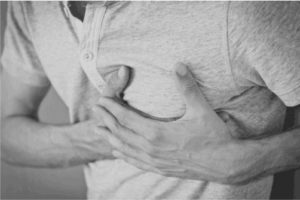
The most common symptom of a heart attack is chest pain, which usually feels like fairly mild to severe discomfort accompanied by a squeezing feeling of pressure on the left side or center of your chest.
Chest pain is even more likely to be caused by a heart attack if it is accompanied by other common symptoms.
 Upper Body Pain
Upper Body Pain
A heart attack can also cause pain that radiates through other areas of your upper body… left arm pain, or pain or tightness in your upper back, neck, and jaw.
Shortness of Breath
If you experience shortness of breath without a clear cause, it could be that you are having a heart attack.
Nausea
Nausea and vomiting… when associated with chest pain and shortness of breath… can be another indicator of a heart attack.
Shaklee for a healthy heart..
A big part of changing your lifestyle to avoid heart disease is getting the right heart-healthy nutrients.
Shaklee has some comprehensive supplement combinations that target heart health:
SmartHeart Cholesterol Regimen
Supports cardiovascular health while reducing cholesterol. Includes: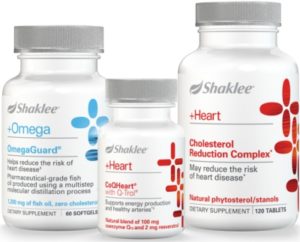
♦♦ Cholesterol Reduction Complex… plant sterols and stanols that help lower cholesterol.
♦♦ OmegaGuard… ultra pure, pharmaceutical grade Omega-3s for heart health
♦♦ CoQHeart… CoQ10 and resveratrol supports energy production in the heart and promotes healthy arteries.
SmartHeart Blood Pressure Regimen
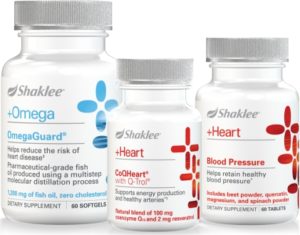 Supports cardiovascular health while helping to retain healthy blood pressure.
Supports cardiovascular health while helping to retain healthy blood pressure.
In addition to:
♦♦ OmegaGuard and
♦♦ CoQHeart, this combo also includes
♦♦ Blood Pressure, which addresses 2 key mechanisms to help retain healthy blood pressure.
Other heart-healthy supplements
♦♦ Vita-E Complex
♦♦ Vita-D3
♦♦ Stress Relief Complex
Why you should switch to Get Clean Dish Washer Concentrate
You can find specials and coupons every day on all kinds of “super-duper-lemon-shine” automatic dishwasher products. So why should you use Get Clean Dish Washer Concentrate?
1)The deep, enzyme-activated cleaning power gently removes tough stains, leaving dishes and glasses sparkling clean.
2)Super-concentrated… cleans 48 loads… just 2 teaspoons in each dispenser cup.
3)No pre-rinsing needed. Removes dried-on food and tough stains, so they rinse away.
4)Dissolves quickly and completely, getting to work right away.
5)Absolutely no chlorine or fragrances, which can pollute the air that you breathe.
6)Leaves no toxic residue or film on your dishes to contaminate food.
7)No phosphates… patented formula.
8)Helps your dishwasher and pipes last longer because it contains no harsh or damaging chemicals.
9)Is sa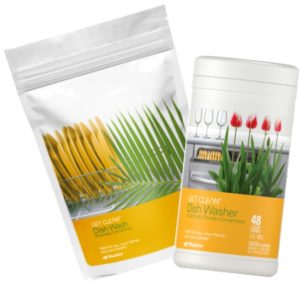 fer to have around children and pets than commercial dishwasher products.
fer to have around children and pets than commercial dishwasher products.
10)Economical. It takes more than one and one-half 45 oz. boxes of Cascade powder to clean the same 48 loads as in one pouch of Get Clean Dish Washer Automatic Concentrate.
11)Comes in a handy resealable pouch* with measuring scoop.
*Refillable dispenser also available.
Dishwasher “dirt”
Some dishwasher products contain dry chlorine that is activated when it encounters water in the dishwasher. Chlorine fumes are released in the steam that leaks out of the dishwasher, and they can cause eye irritation.
Many automatic dishwasher detergents may also contain phosphates which cause rivers and lakes to become clogged with masses of algae and weeds, robbing less aggressive plant and aquatic animal life of oxygen, ultimately resulting in lifeless streams and rivers.

